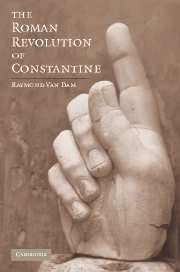Book contents
- Frontmatter
- Contents
- PREFACE
- ABBREVIATIONS
- Map
- Introduction: AUGUSTUS AND CONSTANTINE
- SECTION I A ROMAN EMPIRE WITHOUT ROME
- SECTION II A GREEK ROMAN EMPIRE
- SECTION III EMPEROR AND GOD
- 9 “BEGOTTEN OF THE GODS”: THE IMPERIAL TETRARCHY
- 10 “BEGOTTEN FROM THE FATHER”: THE CHRISTIAN TRINITY
- 11 “ONLY-BEGOTTEN SON”: HISTORY BECOMES THEOLOGY
- 12 THE SEARCH FOR THE CHRISTIAN DOCTRINE OF THE EMPEROR
- Epilogue: ONE EMPEROR
- APPENDIX 1 HISPELLUM: DATE, TEXT, AND TRANSLATION
- APPENDIX 2 ORCISTUS: DATES, TEXT, AND TRANSLATION
- EDITIONS AND TRANSLATIONS
- BIBLIOGRAPHY
- INDEX
11 - “ONLY-BEGOTTEN SON”: HISTORY BECOMES THEOLOGY
Published online by Cambridge University Press: 05 June 2012
- Frontmatter
- Contents
- PREFACE
- ABBREVIATIONS
- Map
- Introduction: AUGUSTUS AND CONSTANTINE
- SECTION I A ROMAN EMPIRE WITHOUT ROME
- SECTION II A GREEK ROMAN EMPIRE
- SECTION III EMPEROR AND GOD
- 9 “BEGOTTEN OF THE GODS”: THE IMPERIAL TETRARCHY
- 10 “BEGOTTEN FROM THE FATHER”: THE CHRISTIAN TRINITY
- 11 “ONLY-BEGOTTEN SON”: HISTORY BECOMES THEOLOGY
- 12 THE SEARCH FOR THE CHRISTIAN DOCTRINE OF THE EMPEROR
- Epilogue: ONE EMPEROR
- APPENDIX 1 HISPELLUM: DATE, TEXT, AND TRANSLATION
- APPENDIX 2 ORCISTUS: DATES, TEXT, AND TRANSLATION
- EDITIONS AND TRANSLATIONS
- BIBLIOGRAPHY
- INDEX
Summary
Eusebius completed his life of constantine after the emperor's funeral in 337 and near the end of his own long life. By then of course he had a longstanding reputation as a historian, the author of Chronicle and Ecclesiastical History. But the primary composition of those historical works had been decades in the past, and even the most recent revisions were by now quite dated. The final entry in his revised Chronicle had mentioned the celebration of the twentieth anniversary of Constantine's reign in 325–326, and the final revisions to History had perhaps included the deletion of references to Crispus, Constantine's oldest son, after his execution in 326. For the narrative of Constantine's early years in Life, Eusebius of course used his History as a source and often simply repeated his earlier account with a few alterations. But by the time he compiled his Life of Constantine, writing history was not his most pressing concern.
Instead, Eusebius spent his final years defending himself and his non-Nicene doctrines. By then one primary opponent was Marcellus, the bishop of Ancyra who was a devoted champion of Nicene theology. Eusebius composed both a merciless critique of Marcellus' doctrines and an extended treatise, entitled Ecclesiastical Theology, that presented his own theology. At about the same time that he was writing these theological treatises, he was composing Life. This context suggests that Eusebius was writing Life with theology, not history, predominantly on his mind.
- Type
- Chapter
- Information
- The Roman Revolution of Constantine , pp. 283 - 316Publisher: Cambridge University PressPrint publication year: 2007

